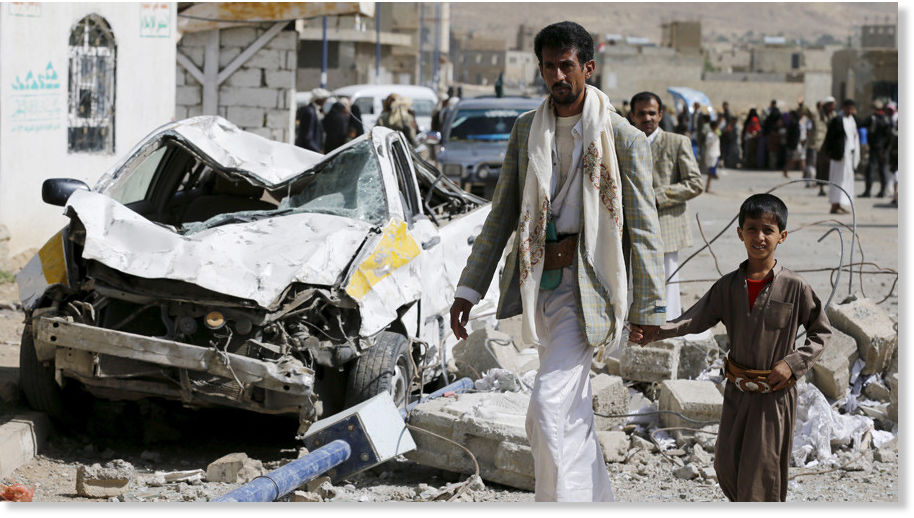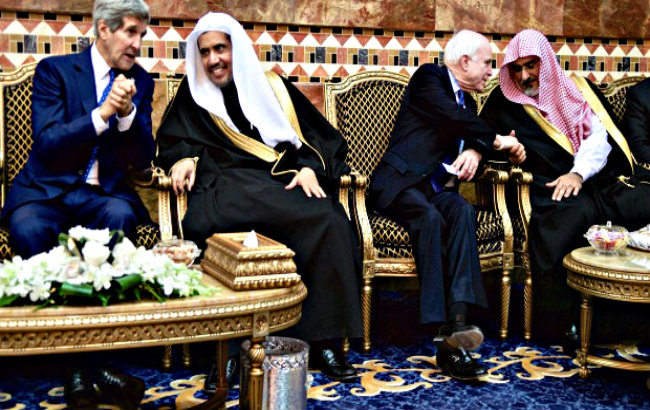
Tyler Koteskey
Rare
Senators Rand Paul and Chris Murphy have introduced a new bill that would limit the sales of air-to-ground weapons to Saudi Arabia.
The bill is intended to protest Saudi Arabia’s conduct in Yemen as it intervenes to prop up the government of Abd Rabbuh Mansur Hadi against Iranian-backed Houthi rebels aligned with former president Ali Abdullah Saleh.
In order to purchase further weapons, the bill would require the Saudis to follow safeguards to minimize civilian casualties and target al Qaeda in the Arabian Peninsula (AQAP) as part of its air campaign.
Both sides of the conflict are guilty of serious humanitarian violations in the year-long civil war, but the Saudis have become notorious for bombing indiscriminately and air-striking civilian targets using American munitions.

The UN estimates that the fighting has killed over 9,000 people so far, including 3,000 civilians. According to the UN High Commissioner for Human Rights, almost two thirds of the conflicts’ civilian casualties have been caused by Saudi coalition bombings.
Just last month, a Saudi airstrike on a crowded market in the northwestern town of Mastaba killed over 119 people. Among the victims were 22 children, according to UNICEF.
In the midst of this civil war, raging primarily in Yemen’s more densely populated west, al Qaeda in the Arabian Peninsula (AQAP), has taken control of huge swathes in the east.
Continued U.S. support for Saudi Arabia’s intervention has played right into AQAP’s hands. The group now controls so much territory that it is able to operate its own ISIS-like mini-state and is stronger than ever before in its 20-year history. Reuters outlines the situation:
“If Islamic State’s capital is the Syrian city of Raqqa, then al Qaeda’s is Mukalla, a southeastern Yemeni port city of 500,000 people. Al Qaeda fighters there have abolished taxes for local residents, operate speedboats manned by RPG-wielding fighters who impose fees on ship traffic, and make propaganda videos in which they boast about paving local roads and stocking hospitals.”
At the American Conservative, Daniel Larison outlines the seriousness of AQAP’s gains:
“AQAP has been benefiting from the Saudi-led coalition’s war for many months. The coalition and anti-Houthi Yemenis have been preoccupied with fighting the Houthi/Saleh forces elsewhere in the country, which has allowed jihadists to operate more freely, to seize and hold territory, and occasionally to cooperate with the coalition-backed forces on the ground against their mutual enemy.
Because the territory it controls has been spared from attacks by the coalition’s bombing campaign, AQAP-controlled parts of Yemen are in relatively better shape than the rest of the country. This has created the unusual situation in which many of the inhabitants of the area controlled by AQAP prefer to ruled by the jihadists.”

ARMS SALES REP: John McCain laps up the GCC cash for his US defense contractors.
Despite these developments on the ground, Senator John McCain is skeptical of limiting sales to Saudi Arabia.
“The Iranian backed Houthis were about to take over Yemen, so I suggest he reevaluate,” McCain said of Chris Murphy. “We wouldn’t do anything about it, so the Saudis did.”
McCain’s belief in a Saudi coalition victory ignores recent history. Under the pan-Arabist regime of President Gamal Abdel Nasser, Egypt intervened in Yemen in 1962. Nasser’s forces supported a coup seeking to overthrow the Yemeni monarchy and win a new ally.
Saudi Arabia opposed Nasser’s ambitions and funded royalist militias, including the future backbone of the Houthi rebellion, the Shiite Zaydi sect. The intervention was remembered as “Egypt’s Vietnam,” and helped lead to Nasser’s defeat in the Six Day War with Israel. Saudi Arabia has returned to fight the same people it funded scarcely a half-century ago.
Maybe this conflict will be dubbed “Saudi Arabia’s Afghanistan.”
Given the unsavoury players on both sides and the messy historical baggage, Paul and Murphy oppose continued unrestricted American involvement in the conflict.
“I have yet to see evidence that the civil war we’re supplying and supporting in Yemen advances our national security,” Murphy said in a statement. “The more it drags on, the clearer it becomes that our military involvement on behalf of the Saudi-led coalition is prolonging human suffering in Yemen and aiding the very groups that are intent on attacking us.”
More recently, it’s surfaced that arming Saudi Arabia may be doing more than indirectly empowering AQAP. In February, al Qaeda forces were seen fighting alongside Saudi-backed pro-government troops in the battle for the southwestern Yemeni town of Taiz.
Limiting our bomb sales to Saudi Arabia may no longer be a question of stemming a humanitarian disaster and anti-American resentment; it may be about stopping ourselves from supplying al Qaeda’s new air force.
***
Tyler Koteskey is a YoungVoices Advocate who lives in Washington, D.C. Follow him on Twitter at @TKoteskey76
READ MORE YEMEN NEWS AT: 21st Century Wire Yemen Files















